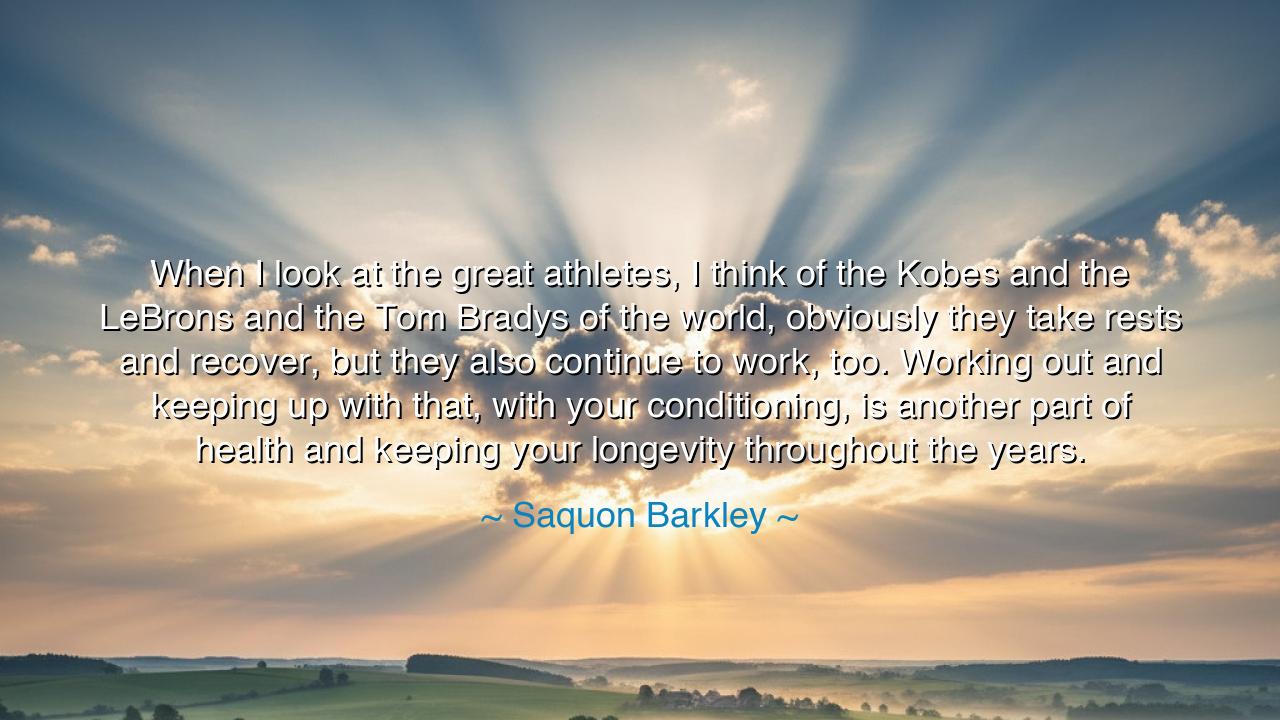
When I look at the great athletes, I think of the Kobes and the
When I look at the great athletes, I think of the Kobes and the LeBrons and the Tom Bradys of the world, obviously they take rests and recover, but they also continue to work, too. Working out and keeping up with that, with your conditioning, is another part of health and keeping your longevity throughout the years.






“When I look at the great athletes, I think of the Kobes and the LeBrons and the Tom Bradys of the world; obviously they take rests and recover, but they also continue to work, too. Working out and keeping up with that, with your conditioning, is another part of health and keeping your longevity throughout the years.” – Saquon Barkley
In this reflection, Saquon Barkley, the warrior of the gridiron, speaks not merely of sport but of discipline, endurance, and the eternal balance between rest and labor. His words carry the weight of a truth that the ancients themselves would have honored: that greatness is not forged in the glory of a single moment, but in the unending rhythm of effort and renewal. He gazes upon the titans of modern sport — Kobe Bryant, LeBron James, Tom Brady — and sees not only their triumphs but the sacred ritual that sustains them: the harmony between work and recovery, between striving and stillness.
For in every age, the path to mastery has demanded not only strength of body but wisdom of soul. The ancients spoke of the hero who must temper his power with patience, his ambition with rest, lest he burn too brightly and be consumed. Barkley’s words echo this same ancient law of balance. He reminds us that true longevity — whether in sport, art, or life — belongs not to those who sprint the fastest, but to those who understand the rhythm of persistence. To train the body without pause is folly; to neglect the craft in the name of comfort is decay. The wise find the middle way — where discipline and recovery become twin guardians of greatness.
Consider the life of Kobe Bryant, the “Black Mamba,” whose devotion to his craft became legend. He rose before dawn while others slept, his mind aflame with purpose. Yet even Kobe, in his final years, spoke of learning to listen to his body — of finding balance, of understanding that greatness demanded not only endless effort but strategic restoration. His workouts were acts of worship; his rest was preparation for battle. Thus he embodied the eternal truth Barkley speaks of: that health is not the absence of motion, but the mastery of energy — the ability to rise, fall, and rise again with purpose.
The same truth guided Tom Brady, whose career defied the limits of age and expectation. When others yielded to time, he pursued excellence through precision — diet, sleep, stretching, mindfulness. His body became not a temple of pride, but of care. He understood that victory belongs not to the strongest in youth, but to the disciplined over time. Barkley’s admiration for such figures reflects the recognition that conditioning is not punishment, but preservation — the art of staying ready, of keeping the flame alive through the years when others fade.
Even in the days of old, the warriors of Sparta and the philosophers of Athens knew this sacred truth: that the body and the spirit are one, and both require constant cultivation. The Greek athletes of Olympia trained not only for glory but for virtue, believing that to neglect the body was to dishonor the gods. Yet they also knew the wisdom of recovery, of allowing the muscles and the mind to renew. This rhythm — of strain and restoration — is what Barkley calls the secret to longevity, the art of lasting not for a season, but for a lifetime.
But Barkley’s words speak beyond the stadium. They are a call to all who strive — artists, builders, thinkers, dreamers — to tend their energy with care. Life, like sport, demands endurance. It demands that we work relentlessly, yet also that we pause to rebuild, to reflect, to heal. Without balance, passion becomes exhaustion; without rest, ambition becomes ruin. He teaches that greatness is not a moment of victory, but a lifetime of alignment — body, mind, and spirit in disciplined harmony.
Therefore, children of the future, heed this wisdom: honor your labor, but honor your rest as well. Do not fear hard work, for it strengthens the soul, but do not despise stillness, for it renews your strength. Build your life as the athlete builds his form — with intention, humility, and perseverance. When fatigue comes, rest; when dawn breaks, rise again. For greatness is not found in a single sprint, but in the sacred rhythm of effort and renewal.
And so, let Saquon Barkley’s truth endure like the echo of an ancient hymn: the key to health, strength, and longevity is not in the extremes, but in balance. Train your body and mind as one; cherish both motion and rest. In this way, you will not only endure the years — you will triumph through them, shining with the steady light of one who has mastered both the fire of will and the peace of wisdom.






AAdministratorAdministrator
Welcome, honored guests. Please leave a comment, we will respond soon